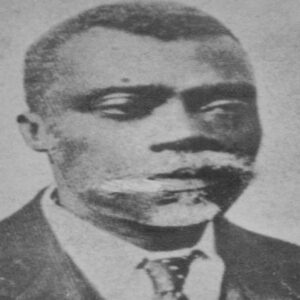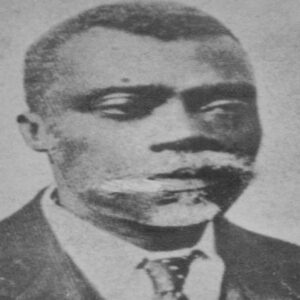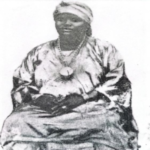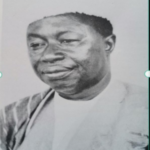
Alfred James Shorunkeh-Sawyerr (circa 1861-May 18, 1929), bookseller, printer, journalist, and eventually practicing lawyer, was a forceful and outspoken participant in public affairs in the last days of Krio (Creole) influence over colonial policy.
He was born about 1861, the son of T.J. Sawyerr, an established printer and bookseller who had opened the first bookshop in Freetown, and was also a member of the legislative Council from 1883-1894.
After attending the Church Missionary Society Grammar School in Freetown he was educated for six years in Britain, attending the Monkton Coombe College in Bath. Alfred then went into his father’s business together with his brother John (q.v.) In 1886 he returned to England and was called to the bar at Gray’s Inn in 1889. Following a practice of Africanization which became fashionable in Freetown,he changed his name to Shorunkeh-Sawyerr.

An original, independent thinker, Shorunkeh-Sawyerr on his return from Britain joined the Sierra Leone Association. This was originally founded in 1872 as the Native Association, and was mainly concerned to foster the mercantile interests of its members. It was reconstituted and renamed in 1885, after which it addressed itself to wider problems of economics and politics.
Following the depression of the 1870s, and 1880s which had adversely affected the Colony’s economy, traders naturally took an active part in debating possible solutions to economic difficulties. Sir Samuel Lewis (q.v.), the prominent Freetown barrister and a leading member of the Sierra Leone Association, presented a memorandum to a meeting of the association on the subject. His main diagnosis, with which all the other members agreed except Shorunkeh-Sawyerr, was that wars in the interior obstructed the flow of trade to the Colony, thereby diminishing its main source of revenue. He put forward a proposal involving peaceful annexation and the declaration of a protectorate over the hinterland,thus acquiring a “permanent jurisdiction” to control the existing “pretty wars for which West Africa has become notorious.”
Shorunkeh-Sawyerr raised serious objections. “I am altogether opposed to annexation, no matter by what means,” he declared. Annexation would undoubtedly be beneficial to “European capitalists” but would seriously distort the development of those territories so annexed, and demoralize and stunt the growth of their peoples, whose interests Sir Samuel had totally ignored in proposal formulated mainly for the benefit of trade. “Civilized nations” in history were usually imperialists who sought their own ends, and offered little advantage to the peoples they exploited. Interrupted by another member, Zochonis, who shouted “Civilization!” he countered with “your rum and gin civilization, I suppose.” With a quick piece of repartee, Lewis pointed out that Shorunkeh-Sawyerr’s father would never have been able to send his son to England to learn speech-making had it not been for the civilization he now decried.
The association resolved to press for peaceful annexation; but when a mass meeting was organized to petition the Secretary of State for the Colonies,many members refused to support it, fearing that they would be taxed directly to repay the imperial loan required to affect the “peaceful annexation.” Thus, the association fell apart.
At about this time,a “new-found African consciousness” expressed itself in the founding of a Dress Reform Society,aimed at popularizing and making respectable loose African robes, more suited to the climate than western dress. Many people also took African names as middle names or as hyphenated prefixes to their surname. This striving for African origins was in the work of Dr. E.W. Blyden, who was dedicated to the reshaping of education to include Africa culture. These views, however, met with fierce opposition from people like Sir Samuel Lewis. Shorunkeh-Sawyerr for his part seems to have held rather inconsistent views on the subject. For despite his change of name he held that Krios were “Black Englishmen” and should behave accordingly.
Meanwhile, he had been pursuing his career in journalism. During the 1880s he published Sawyerr’s Advertising Medium, and a newspaper pamphlet called The Sierra Leone Ram. He and his brother, John, also educated in England, continued to run their father’s press and in the 1890s came out with a new magazine, Saturday, Ho!, intended to encourage people to read more widely. This magazine continued even after their father’s death in 1894. Alfred and John went into legal partnership,a venture which apparently succeeded well.
In 1911, Shorunkeh-Sawyerr became a member of the Legislative Council. Intellectually sharp, eloquent, and commanding sufficient legal respect, he seemed the logical successor to Sir Samuel Lewis who had died in 1903. But he lacked the ability to inspire people as a leader.
In any event, times had changed. The days when the colonial administration respected and took note of enlightened Krio opinion were over. Colonialism was fully established and the Legislative Council, in the 19th century a forum for discussion and debate, lost its democratic character and was reduced to rubber stamping policies already decided by the governor and his officials.
Although he stayed on as a member until 1924 Shorkunkeh-Sawyerr made little mark there. He died in 1929, five years after leaving the Legislative Council.


